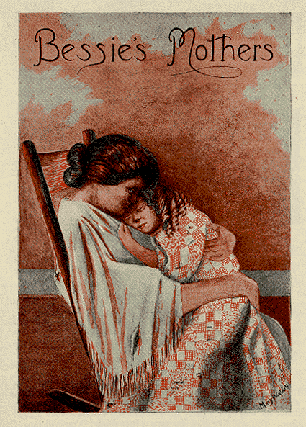Bessie's Mothers
by Mary Waddell
The fire was out and the room cold. Wrapping a piece of an old quilt about her little girl, Mrs. Weston held her in her arms.
"Bessie," she began, "Mother has something she must tell you. Tomorrow you are going to take a ride on the train."
"O, won' t that be fine!" exclaimed Bessie, clapping her hands. "Where are we going, mother ?" -
"You are going to live in a pretty new home and-"
"O goody!"cried Bessie. "We won't be cold nor hungry,any more will we?"
"No, dear; you will be nice and warm and have plenty to eat. Mrs.Brown is a lovely lady and I am sure you will like her. She is coming for you in the morning."
"Who is Mrs. Brown, Mother?"
"She is the lady who lives in this beautiful home. Having no children of her own to love, she wants to adopt my little girl."
"I will have two mothers, won't I? But, of course, one will be just a pretend mother. No one could take the place of my own dear Mother," said Bessie, putting her arms around Mrs. Weston's neck.
Poor Mrs. Weston's heart was breaking. O, how could she tell her all! The words seemed to choke her.
"Bessie," she began again, "I can not go with you, but Mrs. Brown will give you pretty clothes to wear, and send you to school, and you will have a nice bed in a little room all your own. No doubt she will have a party for you and you will have such a good time. You will like it, I am sure. just think! You will not be cold nor hungry nor ragged any more. It will be such a good home for my little girl."
"Would I have to stay always, and be Mrs. Brown's little girl instead of yours?"
"Yes, dear."
"Then I'll never, never go!" exclaimed Bessie. "I wouldn't leave you for the whole world! I just couldn't. O, Mother, Mother! Do I have to go? I don't want nice clothes, and I would rather be hungry and cold always if I could just stay with you. Can't I, Mother? Please, Mother, I'll be big after a while and then I can work and help you." With her head nestled close to her mother's, Bessie caressed her cheek with her hand as she coaxed and wept by turns. Mrs. Weston was weeping, too. "Bessie, my child," she said, "Mother wants you more than she can tell you; but she can not see you suffer. Listen till I tell you something. Of course, you remember how your father drank till he was unable to work very much. It took all he could make to buy drink, so I had to go out and earn money for us to live on."
"Mother, why didn't father stop drinking when it hurt him, and then you could have had the money?"
"Because, dear, alcohol in drink makes one want more and more of it till an appetite is formed that is often stronger than a man's love for his family. I worried a great deal about your father, Bessie, and then came the shock of his death. These troubles added to the hard labor I have been compelled to do have taken my strength so that I am no longer able to work. The coal is gone and there is only a mere bite of food left for breakfast. I have no money to buy these things nor to pay the rent. We can not stay here longer. I can not let you go hungry and cold and without a home. It will be very hard for me to give you up, but don't you see, dear, that something must be done?"
"But, Mother, what will become of you?"
"There is a home provided for sick and helpless people. I must go there."
"Is it a nice place like Mrs. Brown's?"
"I believe they will be kind to me, dear." Mrs. Weston did not tell Bessie that many of those who would be her companions in the "poorhouse" were either wrecks from living wicked lives or else had not sense enough to work."Why can't I go there, too, Mother? We could be together then."
"They do not allow children in this home. It will be much nicer for you at Mrs. Brown's. Mother would never, never leave you if she were able to take care of you. Won't my little girl try to be brave when she knows how hard it is for Mother?"
"Will I get to see you sometimes?" asked Bessie. "I hope so, dear. perhaps Mrs. Brown will bring you to see me.
"She'll have to or I'll just cry and cry till she does."
"You must be a good little girl and not cause Mrs. Brown trouble."
"I'll be good if she"ll bring me to see you sometimes."
"You must be good anyway, dear, and love Mrs. Brown for being kind to you."
"Y-e-s-say Mother, I'll stay with Mrs. Brown till I am big enough to work and then I am going to make enough money to keep us, and we will be together again. I'll go to Mrs. Brown's - but O, I don't want to! I don't want to!" wailed Bessie.
Mrs. Weston held her little girl close and soothed and petted her till at last, tired out from much crying, Bessie fell asleep with her head on her mother's breast. When her arms could bear the load no longer, Mrs. Weston tenderly laid her precious bundle on the cot, covered her as warmly as possible and clasping a little hand in hers, sat grieving the whole night through.
When Mrs. Brown came the next morning and saw the grief written on Mrs. Weston's face, her heart was touched.
"Mrs. Weston," she said, "I have wanted a little girl for my very own. But I have changed my mind. if you will come and live with me I will share Bessie with you. You need do nothing now. When you are stronger you can help me with my house work. Bessie, too, can do many little things to help us."
Mrs. Weston could not find words to express her gratitude, and Bessie danced for joy.
"I will have two mothers now!" she exclaimed, "and I will call one of them just Mother, and the other Mother Brown." Putting her arms around her new mother's neck, she said, "I love you very much already, Mother Brown."
---
Published by the Lincoln-Lee Legion, Westerville Ohio
Copyright, 1921. The American Issue Publishing Co.
About the League
Museum Hours
Monday-Saturday: 9am-6pm
Closed on Saturday: 1-2pm
Closed on Sunday









